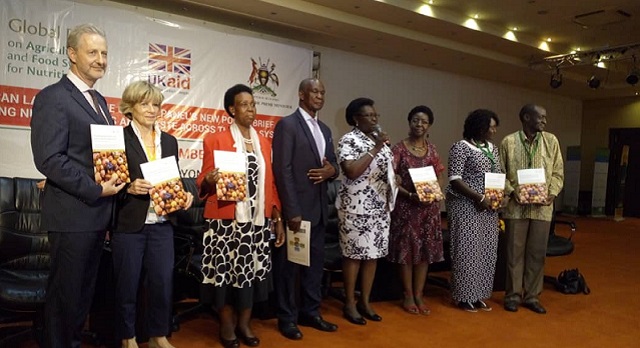
Kampala, Uganda | JULIUS BUSINGE | The government of Uganda through the Office of the Prime Minister (OPM) has promised to use the newly launched policy brief No.12 entitled ‘preventing nutrient loss and waste across the food system’ to improve food security and welfare of the people.
The policy written by the Global Panel on Agriculture and Food Systems for Nutrition was launched in Kampala on Nov.14 by Prime Minister Ruhakana Rugunda alongside other junior ministers, government officials, Global Panel experts and other participants.
Rugunda said that there are gaps in the area of budgeting for food which is why Uganda still suffers from nutrition and dietary problems. He said that there is need to sensitise lawmakers, politicians, who he said have a voice if this budgeting for food system is to improve.
“Stunting, anemia, malnutrition are Uganda’s problems; I don’t know how much our people realise this is a big problem,” he said.
How prepared are we as a country, scientists when it comes to dealing with this challenge, Rugunda asked?
Despite the progress made in recent decades on food and nutrition security, available statistics show that stunting rates in Uganda are at 34% and overweight and obesity in women has increased to 28% – which is not good according to experts.
If not checked, experts say, these numbers are a threat to human resource productivity and economic prosperity.
Patrick Webb, the technical advisor to the Global Panel, said that globally food loss cost US$940bn per year and that the highest losses are recorded in cereals during post-harvest handling and storage; fruit and vegetables in transportation and packaging. Other losses are recorded due to poor management of agriculture output, weak marketing, pollution, and more.
He suggests that governments need to invest in public and private infrastructure, encourage innovations in technologies, system inefficiencies, policies and practices and improve data collection and analysis.
Grace Kwiyucwiny, the state minister for Northern Uganda said, for the agriculture sector to yield tangible results, it has to be done as a business and that all players have to coordinate to achieve the same objective.
“This is a nice policy,” she said during the launch of the policy. “It has reawakened us…but implementation is critical.”
Issues in the policy
The policy brief says that a reduction in food loss and waste, particularly in high- nutrient foods, has the potential to yield substantial nutritional benefits, contributing to the achievement of the Sustainable Development Goals.
It says that loss and waste of nutritious foods needs to be an urgent ‘new’ priority for improving diets and nutrition.
“Every year, approximately 1.3 billion metric tons of food produced for human consumption – one third of the total – never reaches the consumer’s plate or bowl yet three billion people today have poor or inadequate diets,” it reads in part.
It adds that the combined threats of micronutrient deficiencies, under nutrition and obesogenic diets pose a serious challenge to policymakers – not only in terms of the health, learning capacity and productivity of their citizens, but also in relation to mounting healthcare costs associated with poor diet quality.
Reducing loss and waste in nutritious foods would yield substantial benefits far beyond addressing hunger and malnutrition – to encompass economies and the natural environment.
The policy says that the gains made would contribute to the efficiencies needed to address climate change. And that eating more of the nutrient-rich food already being produced would unlock savings in water and energy consumption, land use, and resources used in industrial food fortification.
The new policy brief was released after few months, Uwezo, an NGO released results of a survey indicating that majority of Ugandans faced food insecurity.
The findings were that seven people out of 10 interviewed said that they had to skip a meal because of lack of food, 69% said that their households ran out of food, 67% said they were hungry but had nothing to eat while 85% were worried about running out of food.
 The Independent Uganda: You get the Truth we Pay the Price
The Independent Uganda: You get the Truth we Pay the Price





